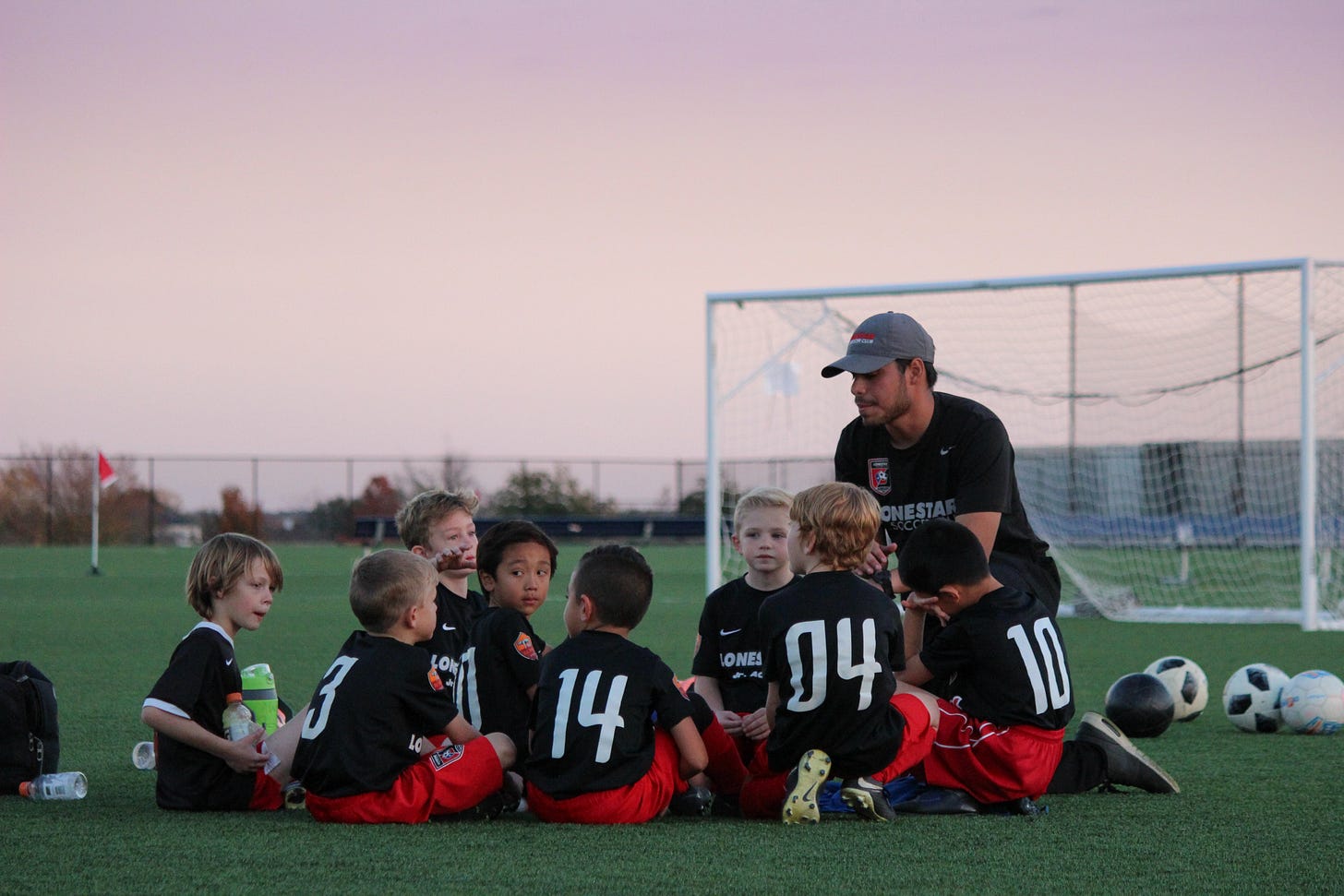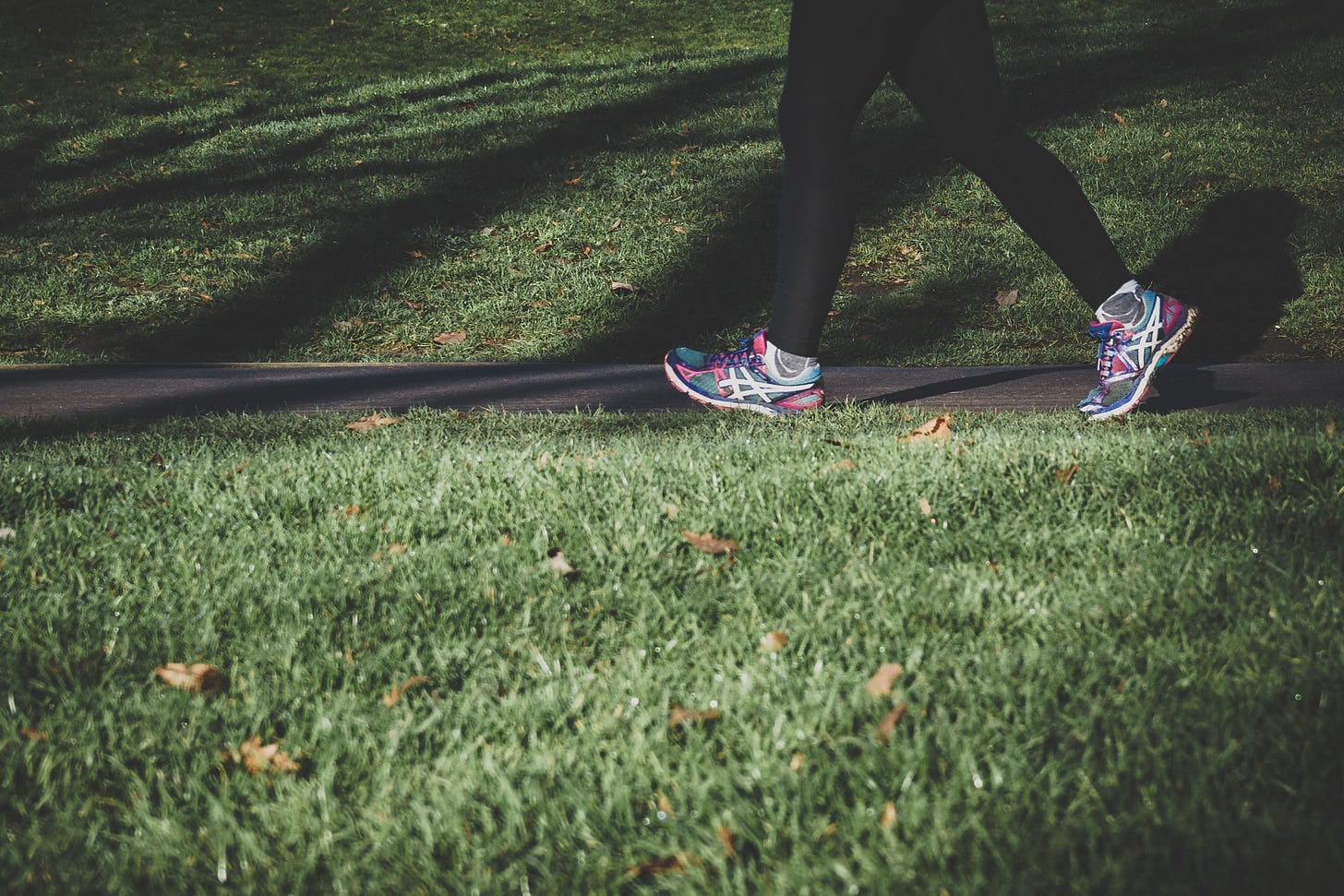Coaches ! You Are Needed. The Time is Now to Prioritize Your Health and Self-Care.
Has anyone else noticed the contradiction in what coaches preach about physical preparation and what THEY practice? Let's explore how we can get back on track and why it's so important.
Unfortunately, most of us, including parents are guilty of not always practicing what we preach.
We mean well, but kids are smart and without the credibility of walking the walk, often our message gets discarded because of it.
In this article The Physical Movement covers the consequences of not being at our best, for ourselves and for those we coach/teach.

Photo by Alyssa Ledesma on Unsplash
We also cover the facts on important topics and solutions on how to start integrating some healthier habits into our busier lives.

Youth coaches undertake the task of coaching on top of their full-time job.
This commitment comes with a price.
Often that price is sacrificing our health.
Evening and weekends away from home. Food on the go on a regular basis. Lots of time on our feet. Responsibility for safety of the team members. All of this can take a toll.
Like a good practice and game PLAN, our health as coaches needs one as well.
Care for oneself is taking on a new dimension during 2020.
The concept of “recommended daily self-care” is being replaced by “required daily self-care”. The only medication to available right now for COVID19 is a strong immune system. A strong immune system comes with a little luck and a lot of good choices.
Coaches, for us to make an impact, we must stay healthy. We must be able to stay on the field, on task and fulfill our obligations.
As coaches, we are givers.
We tend to put all our efforts in making sure others are benefiting.
Now is the time to ensure we can do that for as long as we want by taking care of ourselves.
Good sports coaches are teachers who possess many skills and qualities. What defines a good coach are many things. including strong positive energy, enthusiasm, supportive in nature, trusting, focused, goal-oriented, knowledgeable, observant, respectful, patient and a clear communicator.
Among the many qualities good coaches have, a commitment to the sport and youth/player development is often the driving one.
We don’t have to look too far to see that our coaches have fallen behind in taking care of their health.

Then there is the impact of competition on coach’s physiology.
A few years ago, news program monitored this very thing. The 59 year old coach monitored at the time had his heart rate consistently up to 70% of his max during the game. For an extended time. see reference 1 below.
Let’s think about that for a second.
While not all youth coaches may get as intense as college coaches during competition, the evidence is strong that the lifestyle choices + game time stress = increased physical demands on the body.
Role modelling is part of the standard we want to set for our athletes yes? Do we see a disconnect if the coaches we have in place don’t walk the walk?
As always, The Physical Movement explores solutions. Let’s dig in.
Let’s break it down into 3 categories of our lives that requires planning and management for coaches to be at their best.
Nutrition.
Sleep.
Exercise.
Nutrition: What we consume impacts HOW GOOD a coach we are to our young athletes.

Most of us have been there (or are there!)
When we are honest with ourselves, our diet is not that good.
Why? Because a good diet, a balanced one, is hard to accomplish.
It requires a foundational approach of:
1. Knowledge. Understand what good nutrition means and the impact of a bad diet.
2. Preparation (practice). Invest in taking the time to prepare and plan meals.
3. Discipline to repeat them. This become non negotiable if we value our role as coach and more important our health.
Most of us KNOW what a good diet is, but we fall apart in the other 2 areas.
Fast food, coffee, sugar and alcohol are easily integrated into our lifestyle.
Blood pressure gets too high. The pounds add on. We get grumpy and staying focused is harder. We get tired quicker.
This is not the impact of getting older. This is paying less attention to our life choices, including what we consume.
The point is that being at our best is almost impossible unless you eat well.
From the British Journal of Sports Medicine editorial in 2013:
It is time to bust the myth of physical inactivity and obesity: you cannot outrun a bad diet.
In the past 30 years, as obesity has rocketed, there has been little change in physical activity levels in the Western population. This places the blame for our expanding waist lines directly on the type and amount of calories consumed. However, the obesity epidemic represents only the tip of a much larger iceberg of the adverse health consequences of poor diet. According to The Lancet global burden of disease reports, poor diet now generates more disease than physical inactivity, alcohol and smoking combined. Up to 40% of those with a normal body mass index will harbor metabolic abnormalities typically associated with obesity, which include hypertension, dyslipidaemia, non-alcoholic fatty liver disease and cardiovascular disease. However, this is little appreciated by scientists, doctors, media writers and policymakers, despite the extensive scientific literature on the vulnerability of all ages and all sizes to lifestyle-related diseases.
Instead, members of the public are drowned by an unhelpful message about maintaining a ‘healthy weight’ through calorie counting, and many still wrongly believe that obesity is entirely due to lack of exercise. This false perception is rooted in the Food Industry’s Public Relations machinery, which uses tactics chillingly similar to those of big tobacco. The tobacco industry successfully stalled government intervention for 50 years starting from when the first links between smoking and lung cancer were published. This sabotage was achieved using a ‘corporate playbook’ of denial, doubt and confusing the public.
Coca Cola, who spent $3.3 billion on advertising in 2013, pushes a message that ‘all calories count’; they associate their products with sport, suggesting it is ok to consume their drinks as long as you exercise. However, science tells us this is misleading and wrong. It is where the calories come from that is crucial. Sugar calories promote fat storage and hunger. Fat calories induce fullness or ‘satiation’.2
Nutrition, diets and fat loss are BIG business.
Part of the business is to make it sound complicated.
The Physical Movement covered the impact of sugary sports drinks here.
How do we get back on track?
Follow the basics, let’s attack nutrition with the same foundational approach we would discuss with our young athletes.
This is what we mentioned earlier.
Fundamentals.
1. Knowledge
2. Preparation (practice).
3. Discipline in execution.
Specifically around nutrition:
Eat real food. Have protein at every meal and vegetables every day. Mix in the colors on the veggies.
Reduce inflammation. (reference: eat real food). See resource/reference 3 below.
Most of us show symptoms of being dehydrated. Drink lots of water. A great resource below. 4.
Minimize or eliminate intake of sugar and alcohol (reference reduce inflammation)
Understand what foods are high in toxins (fast food) and reduce them.
Go through a couple of days of 12-18 hours of intermittent fasting during the week.
Sleep: Because of lack of sleep, we suffer and so do those around us.

Photo by Lauren Kay on Unsplash
One of the simplest ways in being a healthier and better coach is making sure we get enough sleep.
Unfortunately, lack of sleep has become a badge of honor to many. In the modern age, the increasing demands of family commitments, coaching and work commitments have left sleep as a sacrificial lamb.
But the repercussions are significant.
Lack of sleep has been associated with Alzeimer’s disease.5
The following have also been associated with sleep deprivation:
Mood swings.
Weight gain.
Memory issues.
Trouble thinking and concentrating.
Increase of accidents.
Weakened immunity.
High blood pressure.
Higher risk of heart disease.
Higher risk of diabetes.
Poor balance.
Might these be important to being a good coach?
Weakened immunity, weight gain, mood swings, memory issues, trouble thinking and concentrating.
As coaches, we have a lot on the go. Have you ever met one who did not?
Sacrificing sleep often becomes a shortcut.
Understanding the consequences of this is critical:
• In Canada, the recommendations for those 18-64 are 7-9 hours of sleep per night. 1 in 3 adults aged 35-64 are not getting enough sleep.6
• Similar stats have been forwarded for those in the USA based on the study below.7
What is interesting here is that researchers found lack of sleep is rising from approx. 30% in 2010 not getting enough sleep to 35.6% in 2018.
The IMPACT of NOT ENOUGH SLEEP:
In “The Business of Sleep” Professor Vicki Culpin, a clinical psychologist and expert in sleep and memory, warns: “Never before have significant percentages of working adults been so sleep deprived.”
Her book takes aim at “an age of foolishness” in which large numbers of people seem unaware of what Culpin describes as the “serious cognitive and health consequences of insufficient or poor quality sleep… despite the addition of sleep hygiene courses in corporate wellbeing and occupational health packages”.8.
Professor Gilpin gave a great TED talk on the topic, covering topics on how less than 7 hours of sleep reduces alertness by 32%! (link to TED talk below. 9).
Around sleep:
Knowledge. Understand the impact of not enough sleep.
Preparation. Do what is required to get the 7-9 hours nightly.
Discipline in execution. Should be non-negotiable if we value our role as Coach and most importantly our health.
Regular exercise: like nutrition, it is portrayed as complicated and difficult. It does not have to be.

Photo by Arek Adeoye on Unsplash
Not simple in many eyes, however, mindset becomes critical in getting enough exercise. If we treat our role as coaches as needing to be at our best, then we can learn from our athletes and their preparation.
Let’s go back to our 3 pillars: Knowledge. Preparation. Discipline.
Knowledge: understand the importance of regular exercise.
Preparation: invest in prioritizing daily activity. There is a lot of research that makes it very clear that consistency is the most important aspect of any exercise routine or program.10.
Discipline: Make it non-negotiable if we value our role as coach and most importantly our health.
When we tie in daily movement and exercise to nutrition and sleep recommendations, we become that team that all coaches dream about. That team of good, deeply talented and committed players that are a joy to work with.
Most of us know how important daily exercise is. Many of us fall off on the preparation (practice) and discipline to do it.
Contrary to what most of the media and popular culture will believe, you don’t need hours at the gym or fancy equipment to benefit from daily activity.
We know that if we don’t move enough, we will lose strength and power. Our immune system will suffer, we will have trouble sleeping, focusing, and our energy levels will plummet. We can go on and on n the benefits of daily exercise. But you know them. But most in Western culture don’t practice what they know.
So let’s tackle some ideas and solutions.
Athleticover40 focuses on exercise prescriptions for those over 40 who want to stay strong and move well. For those who want the energy and ability to focus without compromise.

Below, we share, exclusively from our recent a couch2coach workshop to provide guidance on simple things that can be done daily anytime anywhere.
Note: if you have not exercised in a while or this is new to you in any way, please get the clearance from your doctor before undertaking anything vigorous.
Here are some excerpts from that workshops as simple ways we can build in movement into our daily routine.
References supporting this article:
1. Impact of in game coaching on this coaches body.
https://abcnews.go.com/Nightline/video/basketball-coachs-body-reacts-heated-game-22964549
2. Source for nutritional snapshot in our western culture: https://bjsm.bmj.com/content/49/15/967
3. A great resource on reducing inflammation.
https://www.precisionnutrition.com/nutrition-for-injury-recovery-infographic
4. Hydration. A great resource on getting enough water.
https://www.sportsrd.org/wp-content/uploads/2018/11/The-Science-of-Hydration.pdf
5. Lack of sleep and Alzheimer’s
(https://www.nih.gov/news-events/nih-research-matters/sleep-deprivation-increases-alzheimers-protein).
6. Sleep stats in Canada & USA:
7. USA sleep stats alarming: (https://bit.ly/352XcbO).
8. Sleep epidemic: https://www.theguardian.com/society/2018/feb/25/britons-epidemic-sleeplessness-damaging-health )
9. Professor Gilpin excellent TED talk:
10. Consistency as the most important factor in getting the benefits of exercise:
https://www.nifs.org/blog/in-training-consistency-is-the-key-to-your-fitness-goals
PLAY. LEAD. BE STRONG.
Additional resources:
The Physical Movement has over 100 articles on the website covering leadership through the lens of sports, play and physical activity.
Some of our best viewed articles include:
The Best Teacher & Coach I Ever Had Stood Out From The Rest with this 1 Skill
The Hero of His Own Story: Meet Ben Fanelli.

